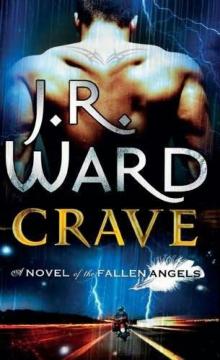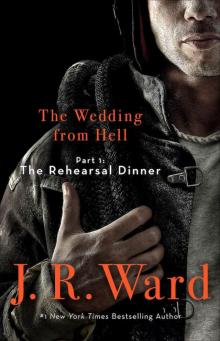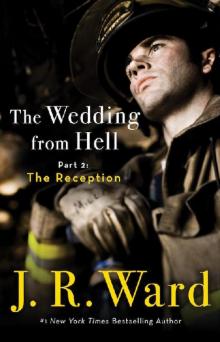- Home
- J. R. Ward
Crave fa-2 Page 6
Crave fa-2 Read online
Page 6
Which meant it was used as a notifier when Isaac was sleeping.
In her experience, the only kind of criminal element with access to this caliber of equipment was a drug lord or very high-level Mafia capo. Her client’s affect and physical appearance matched neither of those profiles—typically, those were older men, not under-thirties who were built like enforcers.
There was one other possible explanation, however.
She got out her cell phone and dialed up a number that she’d used too many times in the past.
When the call was answered, she took a deep, long one and felt as though she were jumping off a cliff.
“Hi, Louie, how’s my favorite PI doing?. . . . Aw, that’s sweet of you. . . . Uh-huh. . . . I’m good.”
Liar, liar, liar on that one.
While the two of them played catch-up, she headed back to the money stash and wiped the doorknob of the closet with her square of cloth. “As a matter of fact I do need something. If you have some time, I have somebody I’d like you to check out for me, please?”
After she told Louie all she knew about her client, which wasn’t more than a name and a birth date and this inconsequential address, she hung up.
The question was, of course, what now?
She hadn’t believed Isaac Rothe when he’d told her he had cash.
So she’d posted his bail herself.
It had been her only choice: The court was willing to let her client off, but the bailsmen wouldn’t touch the case. Too much of a flight risk.
Which suggested the judge might have had his head wedged when he’d made his decision.
Oh, wait . . . that would be her in this situation.
Looking around the empty apartment, she realized that her client was about as substantive as a draft. There was no way he was going to stick around for his hearings.
Hell, he probably wasn’t going to be here a minute past when he was released. He clearly had resources, and his things were backpack portable.
She glanced at the door.
Good thing she could afford to lose that twenty-five grand of hers. The plan had been to pledge it on faith so that he trusted her and would let her help him.
But it was probably going to end up being a very expensive lesson in not investing in people you didn’t know and shouldn’t trust.
CHAPTER 7
It was six p.m. when Isaac was finally brought out of holding by a guard. In spite of how long it took to come and get him—and he had a feeling the staff had been taking their own sweet time—the process for his release was smooth and quick now that they had decided to let him out: Cuffs to be unlocked—theirs. Signatures to be inked—his. Clothes to change out of—theirs. Clothes to change into—his. Wallet returned.
All he could think about was his attorney. He couldn’t believe she’d gotten him bail.
Or carried money for him.
Man, he owed her. Without Grier Childe, he wouldn’t be on the verge of the freedom that was going to keep him alive.
He hadn’t seen her since she’d come to tell him that she’d been successful with the judge, but clearly she’d settled things with his cash or he wouldn’t be back in his own boxers.
The lockdown part of the courthouse was separated from the public section by a series of gates that took him by the room he’d met with her in. The last set of don’t-even-think-about-its was by central processing, where he’d been checked in and photographed.
God, he could still smell her perfume.
With a clank, the steel lock was sprung and the guard gave him a shove in lieu of a “bon voyage”—
“Do you need a ride?”
Isaac stopped dead just inside the waiting area. Ms. Childe was standing across the linoleum, looking like she belonged at a cocktail party and not the county jail: Her hair was in the same twist, but she wasn’t in a suit anymore. She was wearing some kind of little-black-dress thing . . . as well as a pair of sheer black panty hose that made him swallow hard to keep from groaning.
What a woman she was.
“Do you?” she prompted.
Feeling like a Neanderthal for going the goggle route, he shook his head. “No, thank you, ma’am.”
She walked over to the exit and opened the way out, standing to the side, looking like a million bucks . . . and as if she had nothing better to do with her time than play doorstop for him.
Isaac stepped out of the waiting room and into a hall that had just a bank of elevators and a fire exit.
“Let me give you a ride,” she told him as she punched the down arrow. “I know where you live, remember? And it’ll be hard for you to get a cab at rush hour.”
True enough. Plus he only had five dollars in cash on him. “I’ll take care of it.”
“Exactly. By letting me drive you. It’s cold and you don’t even have a coat, for God’s sake.”
Also true. He’d lost his sweatshirt in the rush of getting cuffed. But like everything else about him, that was not her problem.
When she turned away, as if the decision had been made, he stared at the complicated swirls of her hair. He couldn’t see any pins or anything, and yet it didn’t look shellacked.
Magic, he thought.
Without being aware of it, he reached up with his busted punching hand like he was going to touch the nape of her neck. He caught himself in time, though.
And he was gone a moment later, ducking soundlessly into the stairwell.
Which had an open square layout. Perfect.
He made no noise as he slung his body over the banister and let himself free-fall two stories down, catching himself on a just-in-time grab and then swinging his torso up and over. He landed in a silent crouch and didn’t wait even a heartbeat before he took the last set of steps in a leap and hit the exit. As he broke free into the cold April wind, he scared the crap out of the smokers by the door before leaving them in the dust.
Falling into a run, his path took him up through a dark maze of buildings and then down past all the jewelry stores, as well as Macy’s and Filene’s Basement. Rush hour meant the streets were teeming with professional people disgorged from the Financial District, all of them filing into underground T stops or streaming like ants across the park. Fortunately, there was less foot traffic in Chinatown, although more cars—which improved his time.
As he gunned for his place, the exertion helped with the fact that he had nothing but a muscle shirt on, although the wet chill in the air did keep the bruises and the cut on his forehead from pounding too much. When he got to the block where he stayed, he was almost disappointed to slow down—exercise was good for calming his mind and taking the kinks out.
Approaching the three-story house from the rear, he wound in and out of the shallow yards of the neighbors and stopped about thirty feet from the back door. The lights were on in the landlady’s crib and the second floor, but everything was off on his level.
When he was reasonably sure he hadn’t been followed, he bent down and picked up a stone. Staying in the shadows, he closed in, then hauled back and snapped out a throw, clipping the dangling head of the bald bulb over the stoop and putting the exterior lighting to sleep.
Isaac waited, hanging tight right where he was: Speed was often your friend, but that wasn’t always the case. Sometimes going slow was the only reason you woke up the next morning.
Downstairs, a shadow got up and passed from window to window, then made a return trip to the flicker of the television. Not good news, but not a surprise. Mrs. Mulcahy never left her roost except to go get food—and she was the kind of pesky landlord who made him consider the benefits of park benches. Tonight, however, she wasn’t the reason he was sneaking into his own place: Chances were damn good that with his name in the penal system, his address had been popped by XOps, and that meant this location was no longer secure.
He had to get in and out of there fast.
Ten minutes later, it was a case of over to the back steps. Key in the lock. Ghosting up the stairwell.
And on his way to the top floor, he avoided the squeaking steps—which eliminated three out of every four of the bastards.
The door to his flat opened without a sound because he’d oiled the hinges the night he’d moved in, and with a quick twist of the dead bolt, he locked himself inside. A fast listen told him that there were no sounds other than the television below, but he stayed where he was for a minute and a half just to be sure.
When there was nothing out of order that he could sense, he got down to business.
Lightning fast was the speed. Whisper quiet was the way.
Out of the kitchen. Into the front room.
He took one look at his stuff and knew Grier had rifled through it—the shift in the pile of clothes was so subtle only he would notice, but the folding system he’d developed was designed precisely for that purpose.
He put on the sweatshirt he used as a pillow, slipped his two forties into the fat center pockets in front and changed into his combat boots. Ammo, hunting blade and his cell phone went into his pants, and then he put on the black windbreaker that was all he had, coat-wise.
Down to the bedroom. Into the closet.
There had been twenty-seven thousand eight hundred and fifty-three dollars in his stash, so he should have a little something left over after the bail.
He popped off the panel and reached in—
“Fuck.”
He didn’t have to open the Star Market bag and count; by weight alone, he knew that Grier hadn’t taken even a dollar out of the rolls of hundreds and twenties or the fluffy scruff of the unbundled.
But she had been here—Matthias would have taken the weapons to make him less dangerous. And waited around to shoot him in the head.
Shit . . . the cash-intact crap meant either there was a bondsman involved . . . or she’d bailed him out with her own money. And when he’d been processed, there had been no disclosure about a third party posting the benjamins. So she must have.
Damn it.
Snapping back into action, he took the bag and replaced the section of bead board. Then he went around to the windows and doors, flicking off the receptors with his knife and putting the metal plates into his pockets. No more than three minutes later, he left the way he’d come: out the back and quiet as smoke.
The five hundred dollars he left on the counter in the kitchen was going to have to cover the fact that he was breaking his lease, and Mrs. Mulcahy would have to figure out herself that he’d left when there was no sign of him after a couple of days.
The less contact with him, the safer she was.
Same with his attorney.
God damn it.
Down below, in the backyard, Isaac’s senses were razor-sharp as he whispered around to the side of the apartment house and resumed his jog. He didn’t slow his pace until he was a couple of miles away.
Ducking into an alley, the call he made was answered on the second ring: “Yeah.”
“It’s Rothe.”
The fight promoter perked right up. “Jesus Christ, I heard you were in jail. Listen, I can’t bail you—”
“I’m out. We fighting tonight?”
“Shit, yeah! We was gonna have to move from that location anyways. This is awesome. How’d you pull it off?”
“What’s the address and how do I get there?”
The location was some six miles away in a town called Malden, which made sense—the cops in Southie were obviously dunzo with having fights on their turf. And how the promoter hadn’t gotten pinched was a mystery. Unless, of course, he was the one who’d given the tip and gotten out in time.
You never knew with people like that guy.
After Isaac hung up, his next move was to find a bus shelter with a schedule. When the right ten-wheeler monolith trundled along, he boarded it and sat by the emergency exit window.
As he stared out at the apartments and businesses and buildings that passed by, he wanted to scream.
He was getting out of XOps because he’d found his conscience, and that meant he couldn’t take off with Grier Childe having covered him to that extent. She’d looked rich, but twenty-five grand was a lot of cash no matter how much you were worth. Hell, he wouldn’t have felt comfortable with even an anonymous bail bondsman eating that bill. But that elegant woman who he’d lied to? And sent on a dirty errand?
Nope. He wasn’t about to leave her in the lurch.
And didn’t that just complicate everything.
Two hours after she left the jail without her client or any clue where he had gone, Grier stood in the middle of a shindig full of people who were arguably part of her tribe. Everyone was old-money Boston and shared common Mayflower ancestry.
God love them, but some of these blue bloods were old enough to have come over on the boat itself.
Her mind wasn’t on this ballroom at the Four Seasons, however. Or the man in front of her who was talking to her about . . . What was this party for? The MFA or the ballet?
She glanced across at the placards that had been set up. Reproductions of Degas. Which didn’t necessarily help answer that one: All those fuzzy tutus could have fit into either category.
As the bow tie in front of her kept chatting away, she was not tracking. Her mind was stuck back in that hallway at the courthouse . . . when she’d turned around from the elevators and found herself alone.
She’d never even heard Isaac move, much less leave. One moment he was behind her; the next there was nothing but air where he’d been. How someone that size could pull off a disappearance like that was astounding.
Of course, it hadn’t taken a genius to figure that he’d gone out the back stairwell—so she’d punched through the fire door and started after him, taking her high heels off and jogging down in her stocking feet. She went all the way to the bottom of the stairs, pushed out of the exit, and glanced over at a guy who was lighting up a cigarette. When she’d asked him if he’d seen a big man leave, he’d just shrugged, blown a milky white cloud into the air and wandered off.
After she’d put her stilettos back on, she’d gone to the underground parking garage, gotten in her car and driven over to her client’s apartment again. There had been no lights on upstairs, but she hadn’t expected any. The last place someone on the run went was the address they’d given the police.
She’d known her client was a flight risk. What she hadn’t counted on was him being like that smoker’s exhale in the breeze, gone as fast as he had appeared.
Coming back to the present, Grier put her warm chardonnay on the tray of a passing waiter—just as her phone started to vibrate against her hip.
Excusing herself, she ducked out into the hallway. “Hello?”
“Hey, Miz Childe. How you be?”
“Breathlessly waiting for your call, Louie, that’s how.”
“Aw, now that’s sweet, right there. You’re a good woman.” Louie dropped the affable routine and got down to business. “You’re not going to like what I have to tell you.”
Why am I not surprised? she thought. “Let’s get to it, then.”
“He’s a ghost.”
No disagreement there. Still, considering she’d been chatting up her dead brother lately, ghosts could be real. “He looked pretty corporeal to me when I was sitting across the table from him.”
“Well, the Isaac Rothe I was able to locate died about five years ago. Down in Mississippi. He was found dead in a ditch on a cattle farm, and he was nineteen at the time. The newspaper articles I read said he was busted up beyond recognition, but the photo of him while alive that ran with the obit matched the mug shot taken at the police station yesterday night. It’s the same guy.”
“Jesus . . .”
“Not for nuthin’, but the disappear job back then was expensive and extensive. I mean, for him to have lasted this long undercover? Sure, you can do it—this is a big country and all—but you got to be careful, because there are a lot of central databases. He hasn’t been using his own social security number—that is d
ifferent than the one with the name originally—so it could be part of how he stayed gone. But my sense is, he knows what he’s doing. And he has some serious backing.”
“What kind of serious backing?”
“I’ll give you two initials: U and S.”
“Last name ‘government’?”
“I was going with Uncle Sam, but yup, that fits.”
“I don’t get it, though. If he wanted to stay lost, why did he keep his own name? You buy a new social, usually it comes with a different first and last, doesn’t it?”
“You’d have to ask him about the whys. But first thing comes to my mind—he never expected to be found. And I’ll tell you this . . . I’d be careful around him. That body in that ditch in Mississippi didn’t get there by accident. I’d bet my retainer on the fact that someone killed a white boy who looked enough like him to pass in a closed casket—and guess what: Your client there is still breathing. So that SOB could be a murderer.”
Grier closed her eyes. Great. This just kept getting better: She’d not only bailed out a flight risk who had bolted, but a man who might well have killed somebody and faked his own death.
Polite and gentle my ass, she thought, wondering how in the hell someone like her, who’d passed nineteenth grade summa cum laude, had managed to be so stupid.
At that moment, the crowd parted to reveal Daniel in a tuxedo lounging next to one of those Degas. As he toasted her with a champagne flute, his handsome face was wallpapered in told-you-so.
The dead sonofabitch had a point. Even though he’d passed two years ago, she was still performing a kind of CPR on him: Desperate to bring him back to real life, she was caught up in other people’s dramas, that urge to get in and help sometimes the only thing that kept her going.
“You okay there, girl?”
She gripped her cell phone harder and wondered what the PI would say if he knew she was staring into the all-knowing eyes of her deceased sibling. “Not really, Louie.”
“He snow you?”

 Lover Avenged
Lover Avenged Dearest Ivie
Dearest Ivie Lover Unbound
Lover Unbound Blood Fury
Blood Fury Lover Revealed
Lover Revealed The Thief
The Thief Lover Enshrined
Lover Enshrined Blood Kiss
Blood Kiss An Insiders Guide
An Insiders Guide Envy
Envy Crave
Crave Lover At Last
Lover At Last Possession
Possession The Beast
The Beast Lover Awakened
Lover Awakened Lover Reborn
Lover Reborn The King
The King Father Mine
Father Mine Lover Mine
Lover Mine Lover Eternal
Lover Eternal The Chosen
The Chosen The Shadows
The Shadows Lover Unleashed
Lover Unleashed Covet
Covet The Savior
The Savior Devil's Cut
Devil's Cut Dark Lover
Dark Lover Rapture
Rapture The Angels' Share
The Angels' Share Blood Vow
Blood Vow The Bourbon Kings
The Bourbon Kings The Billionaire
The Billionaire The Jackal
The Jackal Revealed
Revealed The Sinner
The Sinner The Jackal (Black Dagger Brotherhood: Prison Camp)
The Jackal (Black Dagger Brotherhood: Prison Camp) Immortal
Immortal Where Winter Finds You
Where Winter Finds You Blood Truth
Blood Truth A Warm Heart in Winter
A Warm Heart in Winter Consumed
Consumed Lover Reborn tbdb-10
Lover Reborn tbdb-10 The Black Dagger Brotherhood Novels 5-8
The Black Dagger Brotherhood Novels 5-8 Prisoner of Night
Prisoner of Night The Wedding from Hell Bind-Up
The Wedding from Hell Bind-Up Envy fa-3
Envy fa-3![Covet - A Novel of Fallen Angels [01] Read online](http://i1.bookreadfree.com/i/03/24/covet_-_a_novel_of_fallen_angels_01_preview.jpg) Covet - A Novel of Fallen Angels [01]
Covet - A Novel of Fallen Angels [01] The Rebel
The Rebel The Black Dagger Brotherhood
The Black Dagger Brotherhood The Rogue
The Rogue The Wedding from Hell, Part 3: Exclusive Excerpt of Consumed
The Wedding from Hell, Part 3: Exclusive Excerpt of Consumed Heart of Gold
Heart of Gold The Black Dagger Brotherhood_An Insider's Guide
The Black Dagger Brotherhood_An Insider's Guide![[Fallen Angels 01] - Covet Read online](http://i1.bookreadfree.com/i1/04/03/fallen_angels_01_-_covet_preview.jpg) [Fallen Angels 01] - Covet
[Fallen Angels 01] - Covet The Renegade
The Renegade Blood Fury: Black Dagger Legacy
Blood Fury: Black Dagger Legacy Rapture: A Novel of The Fallen Angels
Rapture: A Novel of The Fallen Angels Lover At Last: A Novel of the Black Dagger Brotherhood
Lover At Last: A Novel of the Black Dagger Brotherhood Lover At Last tbdb-11
Lover At Last tbdb-11 Lover Revealed tbdb-4
Lover Revealed tbdb-4 Crave fa-2
Crave fa-2 Lover Awakened tbdb-3
Lover Awakened tbdb-3 Lover Unleashed bdb-9
Lover Unleashed bdb-9 The Story of Son
The Story of Son The Wedding from Hell_Part 1_The Rehearsal Dinner
The Wedding from Hell_Part 1_The Rehearsal Dinner An Irresistible Bachelor
An Irresistible Bachelor Rapture fa-4
Rapture fa-4 Possession fa-5
Possession fa-5 The Black Dagger Brotherhood Novels 1-4
The Black Dagger Brotherhood Novels 1-4 Lover Eternal tbdb-2
Lover Eternal tbdb-2 Consumed (Firefighters #1)
Consumed (Firefighters #1) Covet fa-1
Covet fa-1 The Wedding From Hell: Part 2: The Reception
The Wedding From Hell: Part 2: The Reception Lover Reborn: A Novel of the Black Dagger Brotherhood
Lover Reborn: A Novel of the Black Dagger Brotherhood